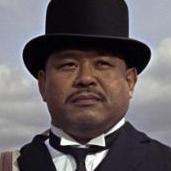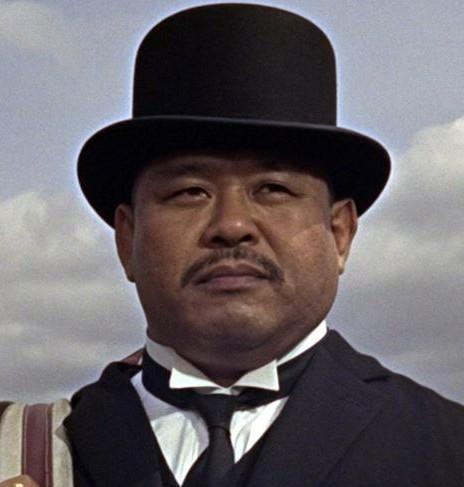-
Posts
12,924 -
Joined
-
Last visited
Content Type
Profiles
Forums
Events
Blogs
Everything posted by Teasing the Korean
-
Almost anyone I know with even a passing interest in jazz has been buying used LPs for decades, and, since prices have tanked, used CDs. Granted, sales of used albums are not helping dead artists, but I would guess that these listeners represent a substantial part of the jazz audience that is not captured in the sales figures. I have a room full of jazz LPs and I cannot remember the last time I bought a new, sealed jazz album.
-
Thanks! Here is a 12-Tone composition by Tom Dissevelt. It was later hacked up and formed the basis for a musique concrete piece titled "Intersection" in Europe and "Twilight Ozone" in the U.S. The latter was part of the famous Sonic Vibrations of Kid Baltan and Tom Dissevelt" LP.
-
And another Jerry Goldsmith:
-
I'm pretty heavily into soundtracks circa mid-1950s to mid/late 1970s, and I've never encountered his name anyplace except for this one theme. What odd careers that so many musicians have. Here is a guy who is utterly unknown in the U.S., yet everyone remembers that one piece of music from the Twilight Zone. While we are on the subject, here are some of Jerry Goldsmith's Twilight Zone "jazz" scores. Jerry claimed in interviews that he did not like jazz very much. If this is true, I find these pieces to be all the more fascinating. There is something about "serious" composers who try to "do jazz." They often get it all wrong on certain levels, but can come up with things that are at least as compelling as any of the best jazz, IMO. I think these pieces are more successful than a lot of the Third Stream stuff I've heard. (And I admit to not having heard some key Third Stream works.)
-
Jazz Theme #3 by Rene Garriguenc. I think it also goes under the title "Street Moods in Jazz." It was not composed for a particular episode; It either was composed as a generic piece for the CBS library or it somehow ended up there. It was available on one of the TZ LPs, the single-disc Twilight Zone CD, and the sadly out-of-print TZ 40th Anniversary CD set. Here it is:
-
You don't mean Bernard Herrmann's season 1 opening, do you?
-
Can you either post a video, or give an example of a scene in a particular episode?
-
Quite. But that could be because 'very few younger listeners listen to jazz' also gets extended to 'jazz is dead'. Which then leads to 'no it's not'..... The odd thing is that in jazz, folk and classical music I experience the sea of grey-hairs situation constantly. Yet in every one of those genres the stage generally contains a more than generous number of young players. Maybe it's an inevitable shift in the population dynamic. We (in the West) now have an increasingly large, retired, wealthy (in some social classes), elderly population with time on their hands. And a younger generation for whom employment, housing etc is a real struggle. So the market has led to the latter servicing the entertainment needs of the former. Can't see any other reason why young people would want to spend their lives playing to a completely different generation. It's not so in pop/rock. Interesting. This leads back to what I wrote in post 52 or whatever. I think it is simply because jazz is no longer culturally relevant. It has become a legacy genre just like classical. When an art form is thriving, the listeners tend to follow; when it is on the decline, the artists tend to follow listener expectations. in order for me to understand what you are saying i need to know if there is a music that is not declining and if so what. There are musics that are not declining, and I would encourage you to seek them out. You may not like all of them - I certainly don't - but I acknowledge their existence.
-
Just picked up a real gem: Gunther Schuller's Seven Studies on the Themes of Paul Klee. Mercury Living Presence, with Dorati conducting. It also contains Gershwin's An American in Paris, one of the earliest examples of what I call Happy Housewife music.
-
Quite. But that could be because 'very few younger listeners listen to jazz' also gets extended to 'jazz is dead'. Which then leads to 'no it's not'..... The odd thing is that in jazz, folk and classical music I experience the sea of grey-hairs situation constantly. Yet in every one of those genres the stage generally contains a more than generous number of young players. Maybe it's an inevitable shift in the population dynamic. We (in the West) now have an increasingly large, retired, wealthy (in some social classes), elderly population with time on their hands. And a younger generation for whom employment, housing etc is a real struggle. So the market has led to the latter servicing the entertainment needs of the former. Can't see any other reason why young people would want to spend their lives playing to a completely different generation. It's not so in pop/rock. Interesting. This leads back to what I wrote in post 52 or whatever. I think it is simply because jazz is no longer culturally relevant. It has become a legacy genre just like classical. When an art form is thriving, the listeners tend to follow; when it is on the decline, the artists tend to follow listener expectations.
-
No one is denying that these artists exist: It is just that they will never achieve the kind of broader cultural relevance and resonance that their counterparts from 50-80 years ago achieved. There are also great classical composers today, but there will likely never be new classical piece that becomes as well-known as the Nutcracker Suite. There were painters who described themselves as "impressionists" well into the 1950s. No one remembers their names. There are probably poets today writing Shakespearean sonnets that are technically very good, but they will not make it into a Norton Anthology. And there may be architects who design gothic castles in their spare time. As Milan Kundera wisely observed, art forms have life spans just like artists.
-

The Henry Mancini You May Not Know
Teasing the Korean replied to Teasing the Korean's topic in Artists
Charade has always been one of my favorite Mancini film scores and one of my least favorite Mancini albums. I will be interested to hear your thoughts when you receive it. -
This topic came up in a thread about box sets, and I did not want to hijack the thread, so I thought I would create my own. Regarding his film score albums, Mancini wrote in his autobiography, "A problem arose from the re-recording of those scores. Because the albums were made up of the most melodic material from each film, a lot of the dramatic music, which is what I really loved to do and really thought I had a feeling for, was left out. It may have hurt my reputation as a writer of serious film music. To this day I would love to have an album of some of those scores as they were heard in the films. The albums gave me a reputation, even among producers, as a writer of light comedy and light suspense, and at that time it was not easy for them to think of me for the more dramatic assignments. I did that to myself." In recent years, some of the film score boutique labels have located Mancini's actual film score tracks and released them on limited edition CDs. Among the gems are the original full versions of Charade, Hatari, Breakfast at Tiffany's and The Thief Who Came to Dinner. Scores that never had an LP release, such as Wait Until Dark and The Days of Wine and Roses, have also been released. These albums are a real revelation, especially Charade. In addition to the light stuff, you get to hear Mancini's skill with spooky, dramatic, and poignant moods that rarely made it to the LPs. Most of the discs I mentioned are still in print, but they are limited. You can find them here: Screen Archives Entertainment You can browse by composer or search by title.
-
Check out the availability of the titles I mentioned, some of them may already be sold out. Treat yourself to "Charade" and "Days of Wine and Roses" if nothing else.
-
That is a great box. Most of my Mancini budget these days is going to the limited edition CDs that contain the film versions (as opposed to the LP re-records). These include Charade, The Days of Wine and Roses, Hatari, Breakfast at Tiffany's, Wait Until Dark, The Thief Who Came to Dinner, and others. Mancini typically included the upbeat, lighter music on the albums, and rarely included the dramatic, scary, or poignant music. He later expressed regret about this approach in his autobiography. The expansions are a revelation.
-
I have the five-disc boxes of the Soft Machine, Henry Mancini, and both Monk boxes. I had most of this stuff on LP, but it was a cheap and convenient way to get it on CD. Bonus tracks on some of these; they tend to use the most recent-ish remastered versions where bonus tracks were added. The Mancini adds the entire "Arabesque" album to the "Breakfast at Tiffany's" disc, effectively making it a six-album set.
-
Agreed. The suites of Journey and 451 are as good as, and in some ways better than, the film versions. Unfortunately, the suite from The Day the Earth Stood Still is marred by speed/pitch drift issues occurring on the cue called "Radar." Otherwise a gem of an album.
-
Yes, I have the Vocalion CD of Stanley Black's aforementioned Exotic Percussion. I hear some very faint distortion on the female vocals but overall it is much cleaner than my vinyl (U.S.) copy. I should add that the mono LP sounded better than the stereo LP. The stereo CD sounds great.
-
Thanks for the replies. I do not hear the distortion on most of the Bernard Herrmann albums, possibly because heavy compression was out of vogue by the time he made those albums (late 60s/early 70s). However, there is distortion on Obsession, and it is always in the same place on multiple copies I've owned. I've wondered if this happened at the recording or mastering stage. Some of the Phase 4 albums I really love include: Stanley Black - Exotic Percussion - a top shelf exotica album Claude Denjean - Moog and Open Circuit - cool Moog pop/rock albums John Keating - The Keating Sound (expanded big band with some exotica content) and Sounds Galactic (an outer space/groovy album with orchestra and electronics) Robert Farnon - Porgy and Bess - not in the same league as Miles/Gil, but a very nicely arranged orchestral album All of the Bernard Herrmann albums.
_forumlogo.png.a607ef20a6e0c299ab2aa6443aa1f32e.png)
